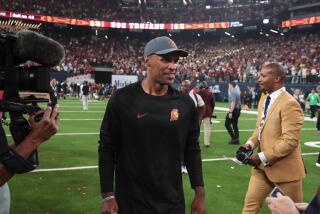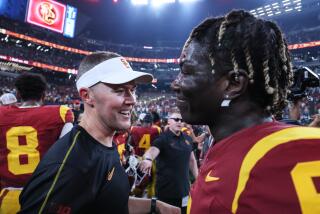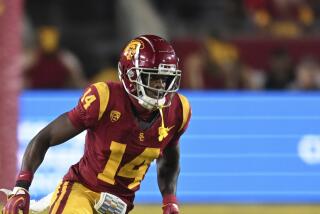Growing by Leaps and Bounds
Jeff Trepagnier had almost finished the 10th grade when he took his first flight.
Back then he was 14, a wiry 6-foot-1 sophomore on the Compton High basketball team. All his hoop buddies had started dunking the ball--”throwin’ down” in court lingo--but Trepagnier couldn’t get quite high enough to jam it through the basket.
During a spring league game his leg strength caught up with his desire. Trepagnier threw one down.
“After that I’d practice [dunking] every day after practice until I got better at it,” Trepagnier said.
Fast-forward six years. Now 20, at 6-4 and 195 pounds, playing shooting guard for USC, Trepagnier may be the leading skywalker of college basketball. His dunk portfolio includes behind-the-neck slams, tomahawk tip-ins and two-handed throwdowns that give the basketball the downward force of a wrecking ball.
Still there is more to Trepagnier (pronounced truh-PAHN-yay) than defying gravity. He’s third on the team in scoring (16.2). He’s expected to bring fans out of their seats at least once or twice a game with acrobatic dunks on alley-oop passes from fellow guard Brandon Granville. He also has gathered 111 rebounds, third highest on the team. When he comes back to earth, he usually defends the opponent’s best player.
His 62 steals have tied the school’s single-season record, and his average of 3.9 steals a game ranks him second nationally. Trepagnier’s 16 blocked shots are second to Sam Clancy (25) on the Trojans.
“Jeff loves the role of defensive stopper,” teammate Brian Scalabrine said. “It’s his ego against somebody else’s. Jeff always wants to outplay whoever he goes against. That’s human nature. And his defense creates his offense. He’s always looking for steals so he can run and dunk.”
Still, Trepagnier’s true appeal is this: He is one of those rare athletes who is capable of showing you something you’ve never seen before.
At the Maui tournament in November, USC was playing Utah State, a morning game, its third game in three days. The Aggies got a defensive rebound and one of the guards raced downcourt on what he thought was a breakaway layup. Trepagnier, in hot pursuit, caught up with him as the guard went up to shoot and blocked the ball off the backboard.
Another Aggie was trailing the play, got the ball and put up what should have been an easy basket. Trepagnier had barely touched the floor but flew up again and slapped that shot out of bounds.
Trepagnier doesn’t merely jump high, he jumps quickly. From a standing start he can leap high enough that he almost touches the rim with his elbows. And no, it did not come from hours in the weight room, pressing leg machines or using other scientific techniques.
“It just came naturally,” said Trepagnier with a sheepish grin. “I guess from all that practice.”
Trepagnier’s basketball evolution is much like that of the 12-5 Trojans, who put their 5-0 Pacific 10 Conference record on the line tonight against Oregon. He has grown from a talented, if scattered, athlete into a solid, all-around player who gains more of Coach Henry Bibby’s trust with each game.
“I can tell I’ve improved,” Trepagnier said. “When I got here I was just basically known as a leaper. But the coaches have worked with me on all the fundamental things: ballhandling, jumping, defense. I know I’m a lot better than when I was in high school.”
USC has historically had difficulties in convincing local blue-chip basketball players to enroll. “I’m waiting on that call from UCLA, Duke, Kentucky . . .” was a response heard too often by Trojan recruiters. But Trepagnier had no such trepidation.
“USC was his dream,” recalled Rod Palmer, Trepagnier’s coach at Compton who is now at Compton Centennial. “Other schools asked about him, but in the beginning of his senior year Jeff made up his mind it was USC.”
Palmer’s 1996-97 Compton High team went 24-6 and won the Moore League title. That squad also featured future Division I college players David Hamilton (Auburn) and Deandre Moore (Vanderbilt), but Trepagnier still stood out.
“He had the same competitive fire he has now,” Palmer said. “He had a will to win and would do everything he could to win. He played nonstop and played hard. He did not jump the way he does now because he wasn’t as strong. But toward his senior year he started to show the things he’s doing at USC.”
When Trepagnier enrolled at USC in 1997 (his recruiting class included junior college transfer Adam Spanich, Phillip Von Backstrom, Kevin Augustine and Greg Lakey), Bibby called him “ a steal,” feeling then he could be one of the most striking athletes he recruited.
“The first time I really took notice of him was at a Nike camp in Indianapolis,” Bibby said. “He couldn’t make a shot to save his life, but he never stopped shooting. That was encouraging; usually guys who can’t shoot stop shooting. I thought then he had potential because he kept trying. You can’t teach athleticism, but you can teach shooting.”
As a freshman Trepagnier appeared in 28 games (starting six) and averaged 5.3 points. Moving into the starting lineup last season, Trepagnier raised that average to 11.8 points, was USC’s second-leading rebounder (5.4), and was the only player to finish in the conference top 10 in steals (1.8), blocks (1.1) and field-goal percentage (.492).
In the highly structured world of college basketball, Trepagnier is a free spirit. Bibby has pulled him out of more than one game this season for taking an ill-advised shot. If he makes a mistake on the offensive end, Trepagnier often will pursue an opposing player all over the court in an effort to steal the ball back and pick up unnecessary fouls.
Scalabrine said the other Trojans are willing to overlook those lapses.
“If you tell Jeff not to do something, then all the other stuff he does you might not get,” Scalabrine said.
Trepagnier is probably criticized more for his jump shot than for anything else. Even though his overall field-goal percentage is above .500, Trepagnier is under .300 from three-point range. At 59%, his free-throw shooting is not that much better than Shaquille O’Neal’s.
“I feel if I keep working on it, it will come,” Trepagnier said. “It’s not like I don’t work on it; I do it every day.”
There’s no doubt that Trepagnier is the most physically gifted of the Trojans. Every coach who has seen him this season, from Duke’s Mike Krzyzewski to Arizona’s Lute Olson, has said the same thing--”he’s as good an athlete as has ever played against us.”
Oregon Coach Eddie Kent said Trepagnier is a difficult defensive matchup for most teams.
“When you look at tape and see [the Trojans] don’t have to run a lot of plays for him, that tells you what kind of player he is,” Kent said. “He’s very good in transition, a great offensive rebounder--a great rebounder, period. He creates problems. He causes you to constantly know where he is because he has the ability to hurt you in many ways.”
From Bibby’s perspective, Trepagnier’s potential is Grand Canyonesque.
“He is our most talented player by far,” Bibby said. “He has great foot speed, great hands, great leaping ability. He’s still learning how to play basketball. . . . He can be a pest, he’s so quick.
“I don’t think we have another defensive player like Jeff when Jeff puts his mind to it. I want Jeff to tap into his overall ability. No one has ever asked him to be a defensive player. They’ve just asked him to be an athlete. I think it’s a challenge for him to be more than that, and it’s a challenge I think he can meet.”
That’s why Trepagnier said he will take whatever the coaches dish out in practice. He believes they are making him good enough to attract pro interest.
“They tell me I haven’t played at 100% yet this season,” Trepagnier said. “They say me, Brandon and Sam [Clancy] are playing at 70% of our ability. So we’ve been working on our games harder to satisfy Coach Bibby and satisfy ourselves.”
Most important, he doesn’t want the wonderful ride that so far has been the Trojans’ season to end abruptly.
“When the season started we talked about having the ability to beat good teams if we did the things we had to do,” Trepagnier said. “The point we’re at now has a lot of upside because we worked hard to get here. And we’re not going to stop.
“USC has always been a football school. And now we’re putting the basketball team on the map. It feels good to be talked about around town.”
More to Read
Go beyond the scoreboard
Get the latest on L.A.'s teams in the daily Sports Report newsletter.
You may occasionally receive promotional content from the Los Angeles Times.






